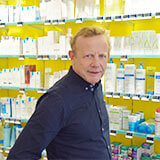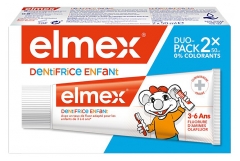Brushing your teeth, an essential act of hygiene
Written by Paul Musset, Doctor in Pharmacy | published on | updated on 15/04/2024

We spend an average of 50 seconds brushing our teeth … and not always with the proper method. However, with a few effective actions, oral health can be much better maintained. What is the proper way to brush your teeth?
Learn more about teeth …
Teeth are the only visible elements of our skeleton. The unconcealed part is the crown, the part in contact with the gum is the neck, and the lower part is the root, anchored in the alveolar bone.
A tooth is made up of several “layers”: the one we see is enamel, a very hard material made of 95% minerals. Underneath is dentin, which is also highly mineralised, but more porous than enamel. At the heart of the tooth is a soft material called the pulp, which is rich in nerves and blood vessels that come out of the root through a hole called the apex.
Teeth appear gradually in infants between the ages of six months and two years. These are the 20 temporary baby teeth. From the age of six, these teeth are gradually replaced and supplemented by permanent teeth. In general, it is after the age of 18 that the last teeth appear, the so-called wisdom teeth. Finally formed, there are 32 teeth.
Starting from the front to the sides and back of the mouth, the different categories of teeth are:
- 8 incisors, which are used for cutting and each have one root
- 4 canines used for shredding, each with one root
- 8 premolars for grinding and chewing, each with two roots
- 12 molars; those in the lower jaw each have two roots whereas those in the upper jaw each have three roots
Why is it so important to brush your teeth properly?
Oral hygiene is essential to protect the teeth. Teeth are used to prepare food for digestion, grinding it and impregnating it with saliva rich in digestive enzymes: salivary amylases. They also play a role in modulating the sounds of our language. For example, there are consonants called dental consonants, such as “n”, “t” and “d”, as well as labiodental consonants, such as “f”, which need teeth to be pronounced. Finally, teeth play an essential role in facial expressions.
However, they must be able to perform all these functions for decades, as they are highly solicited and put to the test day after day.
But despite the resistance of enamel, which is the hardest material in the body, our teeth are fragile. If they are not properly cleaned of food residue, bad bacteria develop and mix with sugars, acids and proteins in the mouth to form infamous plaque. Plaque is at the origin of bacterial infections that cause cavities or even abscesses, not to mention bad breath (halitosis). When plaque hardens and mineralises, it forms tartar, which stains the teeth yellow and irritates the gums. Inflammation of the gums is called gingivitis and can be very painful. Furthermore, if the teeth start to lose support, it may develop into periodontitis.
But that’s not all. Bacteria present in dental and gum infections can migrate into the general circulatory system and cause lung disease, cardiovascular incidents, and may even be the cause behind some premature deliveries due to the amniotic fluid becoming contaminated. These are all good reasons to brush your teeth well!
Brushing your teeth: The right actions
How can you brush your teeth effectively?
It is recommended to brush your teeth two to three times a day. The British spend an average of 45 seconds on this hygienic procedure. That is not enough. It is only really effective if it lasts two to three minutes. Why not use an hourglass, especially to motivate children?
To brush your teeth for that entire duration, give it some structure. It’s the best way to brush all your teeth without forgetting any. For example, start with the upper teeth, brush all the outer faces on one side and then on the other, and then all the inner faces on one side and then on the other, and then do the same for the lower teeth. Pay special attention to the teeth in the far back, which are difficult to access for a toothbrush … but not for germs.
Put a small amount of toothpaste on a slightly damp toothbrush, then position it at a 45 degree angle at the neck of the teeth and roll it, always from pink (gum) to white (tooth) you do not push anything toward the gums. For the final touch after brushing the teeth, floss between the teeth to clean thoroughly where the toothbrush couldn’t reach.
What about the tongue?
Some experts recommend brushing every side of the tongue to clean food debris from it. But is that really a good idea? In fact, it’s better to avoid it. The tongue is tender and fragile. It is covered in hundreds of varieties of good bacteria. Its surface has taste buds, delicate structures that allow you to perceive the taste. Brushing too aggressively can damage the tongue, which cleans itself by salivating and rubbing against the palate.
Which toothbrush should you choose?
“Hard”, “medium” and “soft” toothbrushes are available on the market. In any case, it is preferable to choose a toothbrush with soft bristles that will clean your teeth without damaging your gums. It should be changed at least every three months.
For children, special brushes with small heads and ergonomic handles should be chosen. There are many models, colourful or with a picture of their favourite heroes. The first baby teeth can be cleaned gently with a cotton swab. Brushing must be performed by an adult until the child is at least three years old. Then, little by little, the child will learn to do it alone, but under the supervision of an adult until the actions have been properly learned.
Is a manual or electric toothbrush better? Both are effective, provided that using an electric toothbrush is not an excuse to rush the process under the pretext that the brush rotates quickly!
Choose a toothpaste suitable for each situation
Choosing the right toothpaste is no easy task! It should not be done at random. So how should you choose the right toothpaste?
- “Whitening” toothpastes contain whitening agents that make the teeth appear whiter or abrasive elements.
- Toothpastes for sensitive teeth strengthen the sensitive part of the tooth at its neck. They are very useful if you experience pain from contact with heat and cold, for example.
- There are toothpastes that fight bad breath issues thanks to their mentholated fragrance or antibacterial properties.
- Anti-cavity and anti-plaque toothpastes generally contain antiseptic agents.
- Toothpastes designed to protect the gums work like anti-cavity and anti-tartar toothpastes: they target dental plaque, which causes inflammation and bleeding of the gums, including periodontitis and loosening of the teeth.
Children should use a suitable toothpaste that is not too rich in fluoride (because they swallow most of it). At what age can they use toothpaste? Not until they are three years old. And then a pea-sized amount is enough.
Our teeth serve us for decades. We owe it to them to take good care of them. It’s a question of health … not to mention for a beautiful smile! Cocooncenter has everything you need to take care of your teeth to pamper them as much as possible!
The three key points to remember about brushing your teeth:
- Two minutes twice a day is the minimum to keep your teeth healthy.
- All you need is: a soft-bristled toothbrush, a high-quality toothpaste that suits your needs, dental floss, and the right actions.
- Remember to visit your dentist once a year to identify any problems before they become troublesome.




























